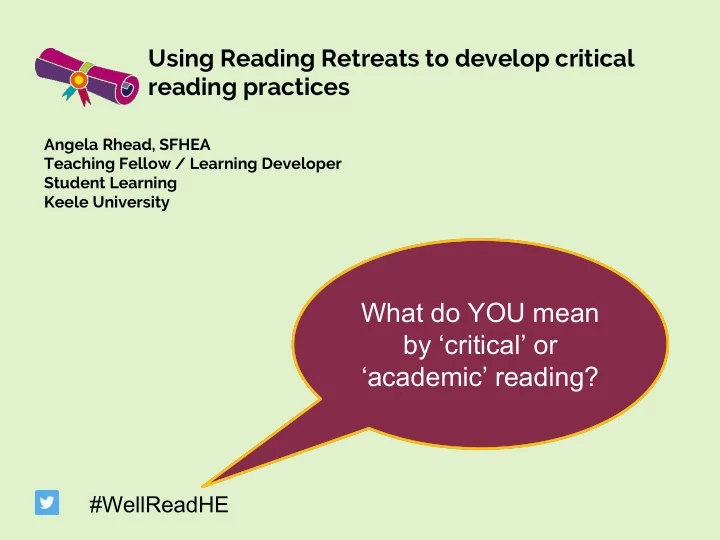

Using Reading Retreats to develop critical reading practices Angela Rhead, SFHEA Teaching Fellow / Learning Developer Student Learning Keele University What do YOU mean by ‘critical’ or ‘academic’ reading? #WellReadHE
Why? “I get lost in the middle “I’ve written my essay… and forget I just need to find what I read references to support it before.” now.” “I get bored” “How many sources do we ?...? have to put in for references? Ten? Twenty?” “Sometimes I have to read the “Range? same thing over Is it some books, and over again” some journals and some websites?”
What: inspiration / innovation
What: the structure
Method 1: The Stage The Scenery The Players Stage Directions
Method 2: Textmapping Scanning, Skimming & Mapping Your Sources Try ‘scrolling’ to get to grips with academic articles and journals... “I get lost in the middle and forget what I read before.” “Sometimes I have to read the same thing over and over again” “I get bored” Scan Skim Map
Open : Closed (inter : intra) Different disciplines Academic Shared disciplines “Readers-in-Residence” Peers UG PG PG ½ day / 3 hours 1 day Small (circa 12) Large (up to 40) Dissertation (Lit Review) Focused
Evaluations 4.918918919 Structure …gaining an improved I came to understand the process with a view to understanding of how to read a incorporating the workshop into the programme. I also journal article and how articles are took away some personal learning which was relevant to my research appreciated. The supportive nature of the group. The Space developmental and layered learning techniques The workshop helped me dive into through the day to get to a useful skill set a world, where reading for Time supporting argument is invalid and skimming is non existent. This It will also develop my teaching in terms of supporting workshop really taught me how to students in their active reading and academic writing. critically analysis every aspect of it has made me reflect on assumptions that I might the journal. have made about what students know about how to Delivery actively read and what to actively read. I have gained a greater understanding of areas to support students How to read a text for academic with accessing relevant materials/ literature/ purpose and having time to read journals. It is something that i want to continue to through a text in a controlled develop from induction and in assessment workshops. environment with support. Discussion I finally feel like I have a method for assessing the value of what I Coming from a scientific background I have never read as opposed to reading blindly looked at reading in this manner before. It has not and hoping what I'm reading is only changed my reading process but also how I relevant to my work. approach research. Truly a valuable experience for 1:1 anyone at any level.
Implications? Possibilities? Lingering Personalisation Collaboration Interdisciplinarity Identity: Student to researcher / enquirer Identity: Academic to educator School ARRs? Selected ARRs? Dissertations based on ARRs? ARR as professional development? Further conversation? #WellReadHE ARR Blog https://tinyurl.com/ARRKeele
Bibliography Abraham, Ulf. (2016). On Their Own but Not Alone: The Difficulty in Competence-Oriented Approaches to Teaching Reading and Writing of Thinking of "Performance" in Communal Terms. Changing English: Studies in Culture and Education, 23 (3), 209-226 Hallett, F. (2013). Study support and the development of academic literacy in higher education: A phenomenographic analysis. Teaching in Higher Education, 18(5): 518-530 Kornhaber, R., Cross, M., Betihavas, V., & Bridgman, H. (2016). ‘The benefits and challenges of academic writing retreats: An integrative review’. Higher Education Research & Development, 35 (6), 1210-1227. Lea, M. and Street, B. (2006) The "Academic Literacies" Model: Theory and Applications, Theory Into Practice, 45 (4), pp.368-377. Lave, W. and Wenger, E. (1991) Situated learning : Legitimate peripheral participation . Cambridge: Cambridge University Press. MacMillan, M. (2014) ‘Student connections with academic texts: a phenomenographic study of reading’. Teaching in Higher Education , 19:8, 943-954 McAlpine, Lynn. (2012). Shining a Light on Doctoral Reading: Implications for Doctoral Identities and Pedagogies. Innovations in Education and Teaching International, 49 (4): 351-361. Middlebrook, R. D. (1994) Instructional Benefits of Textmapping [on-line]. Available at http://www.textmapping.org/benefits.html Murray, R. and Newton, M., (2009). Writing retreat as structured intervention: margin or mainstream?. Higher Education Research & Development , 28 (5): 541-553. Saltmarsh, D. & Saltmarsh, S. (2008) Has anyone read the reading? Using assessment to promote academic literacies and learning cultures. Teaching in Higher Education , 13 (6), 621-632 Shon, P. (2012). How to read journal articles in the social sciences : A very practical guide for students (Sage study skills). London: SAGE. Wallace, M., & Wray, A. (2016). Critical reading and writing for postgraduates (Third ed., SAGE study skills). London: SAGE. Weller, S. (2010) Comparing Lecturer and Student Accounts of Reading in the Humanities . Arts and Humanities in Higher Education , Vol 9, Issue 1, pp. 87 - 106
Recommend
More recommend